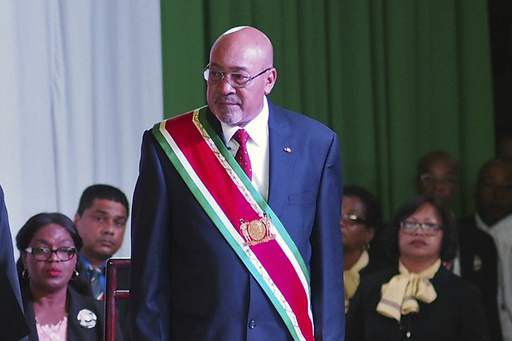
PARAMARIBO, Suriname — Desi Bouterse, a prominent military leader who orchestrated a coup in Suriname in 1980 and later returned as an elected President three decades later amid allegations of drug trafficking and murder, has passed away at the age of 79.
On Wednesday, President Chan Santokhi expressed his condolences to Bouterse’s family, urging the nation to “keep calm and maintain order” in light of the former leader’s death.
Vice President Ronnie Brunswijk took to Facebook to acknowledge Bouterse’s “lasting impact” on the country, indicating that his contributions will be remembered. The specific cause of death remains unclear at this moment.
Bouterse had garnered admiration from supporters for his engaging personality and implementation of populist social initiatives. However, he was also criticized by many as a tyrant, having been convicted of drug smuggling and unlawful killings.
In December 2023, he received a 20-year prison sentence for his role in the 1982 murders of 15 political opponents as part of a protracted legal pursuit that lasted 16 years. Despite the conviction, he evaded imprisonment and never served his sentence.
According to Dutch historian Pepijn Reeser, who authored a biography about Bouterse, “There is nobody who has shaped the history of Suriname since its independence like Desi Bouterse.” Reeser noted that Bouterse was the first individual to surmount the significant social class disparities in Suriname, yet he also marked the beginning of political violence in the nation.
Early Wednesday, supporters gathered outside Bouterse’s residence, visibly emotional and dressed in purple, the color associated with his political party.
Bouterse was born on October 13, 1945, on a former sugar plantation near Paramaribo. In 1968, he moved to the Netherlands, joining thousands of other Surinamese in search of better opportunities. After being conscripted into the Dutch armed forces shortly after his arrival, he graduated from the Royal Military School and served at several military bases.
Just weeks before Suriname gained independence on November 25, 1975, Bouterse returned to his home country to join the newly established military. Initial optimism among young military members dwindled as they became disillusioned with the corruption and favoritism in the government under Prime Minister Henck Arron, leading to Bouterse spearheading a coup on February 25, 1980.
“We took control because we want to save this country from ruin,” Bouterse told a journalist shortly after the coup, emphasizing the need for a drastic shift in national mentality.
Opposition to Bouterse’s regime escalated when he failed to deliver on promises of democratic reforms, ultimately resulting in the infamous “December Murders” where 15 opponents were executed on December 8, 1982. Noted by advocates for justice and history, these murders severely undermined the rule of law in Suriname. Eddy Wijngaarde, whose brother was among the victims, emphasized the long-lasting effects of Bouterse’s reign of terror and the ensuing atmosphere of fear.
Shocked by these events, the Netherlands halted all development assistance to Suriname, while Bouterse’s former bodyguard, Ronnie Brunswijk, initiated a rebellion in 1986. This civil war lasted for six years, leading to widespread human rights violations and numerous fatalities.
Increasing isolation faced by Bouterse’s military junta compelled him to agree to free elections in November 1987. Establishing the National Democratic Party, he secured only a minor presence in Parliament but continued to wield power as the commander of the armed forces.
Tensions between Bouterse and President Ramsewak Shankar in 1990 led to another military takeover, though civilian governance was reinstated the following year. Bouterse officially parted ways with the military in 1993, transitioning into full-time politics and business.
In 1999, Bouterse was sentenced in absentia by a Dutch court to 11 years in prison for trafficking over 1,000 pounds of cocaine but evaded incarceration due to a lack of extradition agreements.
A military court in Suriname began trials in 2007 against Bouterse and 24 others linked to the December Murders. While the prosecution labeled him the main instigator, Bouterse claimed he was not present during the killings but accepted political responsibility as army commander.
In public statements, Bouterse insisted that he would never be imprisoned, no matter the circumstances surrounding the murder trial. Over the years, he reestablished himself as a potent political force, appealing to the diverse ethnic composition of Suriname.
Elected president in 2010, Bouterse embraced his controversial past, even declaring February 25 a national holiday. He pushed for social welfare improvements inspired by similar strategies in Venezuela, allowing him to win reelection in 2015. However, these initiatives contributed to significant economic turmoil characterized by inflation and budget deficits.
As his second presidency faced declining support, Bouterse resorted to the oppressive tactics from his earlier regime, threatening judges and censoring discussions of the December Murders in school curricula.
Despite attempts to quash the murder trial through an amnesty law in 2012—which was later invalidated—Bouterse’s legal and political challenges continued to mount. A verdict was anticipated in 2018 as he confidently spoke of reelection in 2020.
Bouterse had undergone surgery after travels to Cuba for medical reasons, admitting to escaping the public eye periodically. He is survived by three children from two marriages, one of whom, Dino Bouterse, is currently serving a sentence in the U.S. for drug trafficking.

